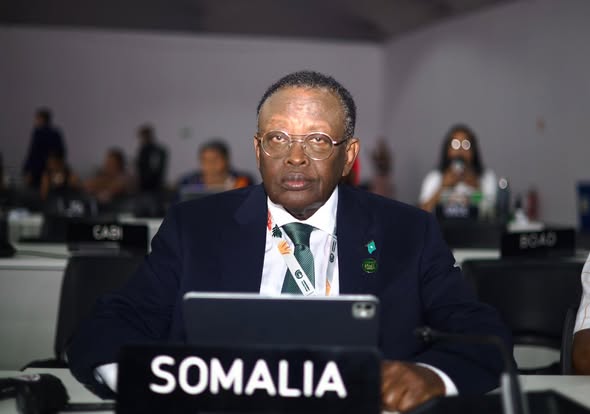Somalia Urges Global Action as COP30 Kicks Off

Major General Bashiir Maxamed Jaamac, Somalia’s Minister of Environment and Climate Change, has called for urgent global climate action during his address at UNFCCC COP30 in Brazil. He highlighted the country’s progress on NDC 3.0, NAP, and LT-LEDS, stressing the need for climate justice, stronger adaptation support, and the transformation of international commitments into practical action for vulnerable communities.
Somalia has renewed its call for global climate justice and increased adaptation financing as the country’s Environment and Climate Change Minister, Major General Bashir Mohamed Jama, delivered a comprehensive national statement at the high-level segment of the UNFCCC COP30 summit in Belém, Brazil.
Addressing world leaders and climate negotiators, the Minister emphasized Somalia’s growing vulnerability to extreme weather events and urged the international community to convert long-standing climate pledges into tangible action that directly supports frontline communities. He noted that Somalia continues to face recurring droughts, destructive floods, and widespread environmental degradation, all of which threaten lives, the national economy, and long-term stability.
Minister Bashiir highlighted the significant progress Somalia has made in strengthening its climate governance over the past year. He pointed to the ongoing implementation of NDC 3.0, which fully aligns with the country’s National Transformation Plan (NTP) and the newly launched National Adaptation Plan (NAP). He further confirmed that Somalia has officially unveiled three key climate frameworks, the NAP, the NDC 3.0 Investment Plan, and the Long-Term Low Emission Development Strategy (LT-LEDS). These documents, he said, form the strategic foundation for guiding the nation toward a more resilient, low-carbon, and sustainable future.
The Minister used the COP30 platform to reiterate Somalia’s demand for fairness in global climate policy, noting that the country contributes the least to global emissions yet suffers some of the most severe impacts. He stressed the need for adequate climate financing, technology transfer, and capacity-building support for developing nations, especially those on the frontlines of the climate crisis. Somalia’s statement centered on three key appeals to the international community: ensuring climate equity, expanding support for adaptation programmes, and turning global commitments into on-the-ground results.
Minister Bashiir also raised concerns over increasing climate-related loss and damage, citing displacement, livestock losses, and the destruction of livelihoods as evidence of the mounting challenges facing Somali communities. He called on global leaders to accelerate the operationalization of the Loss and Damage Fund and ensure that vulnerable countries can access its resources without unnecessary barriers.
The Minister extended his gratitude to the Government of Brazil and the UNFCCC Executive Secretariat for hosting COP30 and for providing a platform for climate-vulnerable nations to voice their priorities. He affirmed Somalia’s commitment to working transparently and collaboratively with international partners to advance national climate priorities and strengthen community resilience.
As negotiations continue in Belém, Somalia maintains that outcomes must prioritize equitable financing, practical climate solutions, and long-term resilience for developing nations. The Ministry of Environment and Climate Change reiterated that it will continue to work closely with global partners to safeguard the country’s environment, protect vulnerable communities, and build a more resilient future for all Somalis.
